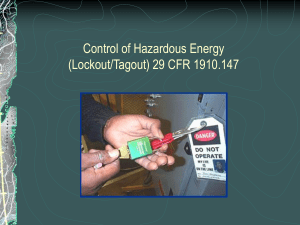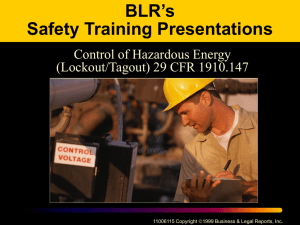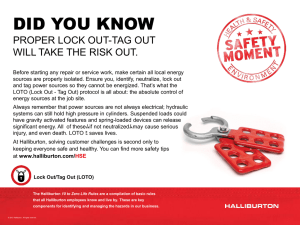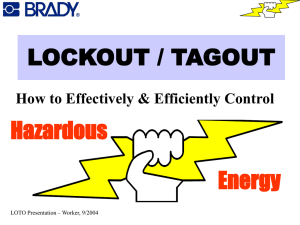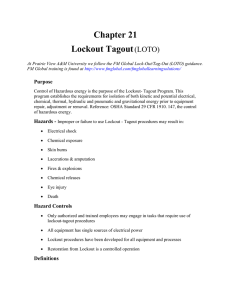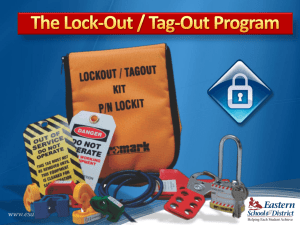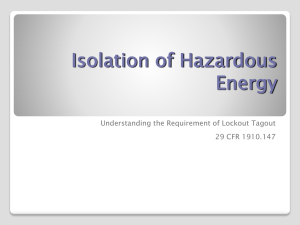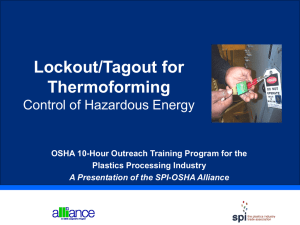Lock-Out/Tag-Out
advertisement
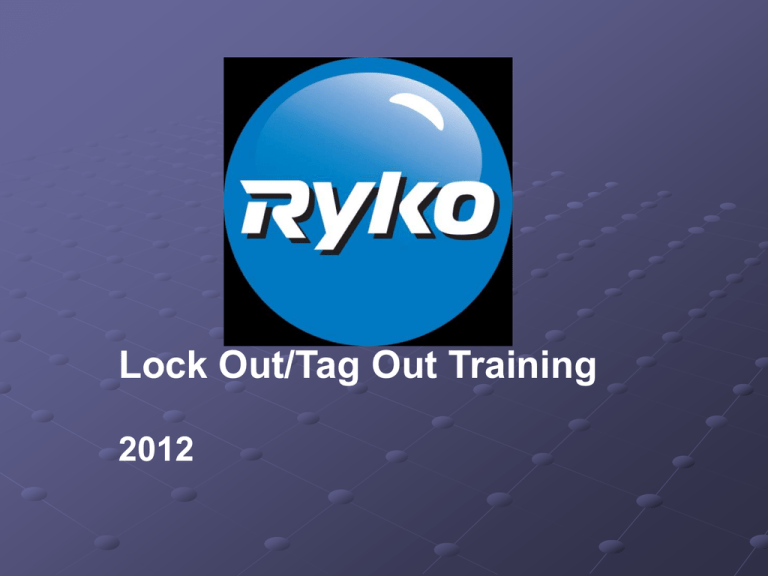
Lock Out/Tag Out Training 2012 Lock-Out/Tag-Out OSHA Definition Lockout/Tagout (LOTO) refers to specific practices and procedures to safeguard employees from the unexpected energization or startup of machinery and equipment, or the release of hazardous energy during service or maintenance activities. Purpose It shall be used to ensure that before any service work is performed, equipment is : Stopped Isolated from all potentially hazardous energy sources Locked Out/Tagged Out Under your control LOTO applies to all powered equipment with energy sources such as Electrical Mechanical Pneumatic Hydraulic The LOTO action may be extended to include equipment upstream or downstream of the work location. OSHA stat- LOTO prevents an estimated 120 fatalities and 50,000 injuries each year Definitions Affected employee- An employee who has operational responsibilities for the equipment that is being Locked Out/Tagged out. Authorized employee- Employee(s) who implement LOTO procedures on equipment and/or perform any work on the Locked Out/Tagged Out equipment. Energy Source- Any source of energy, including, but not limited to, electrical, mechanical, hydraulic, pneumatic, chemical, thermal (>140 degrees F), gas, springs, elevated machine members, gravity, water pressure, or steam. Definitions, Cont’d Group Lockout- When the desired maintenance action requires multiple pieces of equipment to be Locked Out/Tagged Out, production locks will be applied to each respective energy isolating device. The keys will be placed in the lockbox. The production lock key is under the direct control of the affected person or an authorized person. Lockout- The placement of a lock on an energy isolating device in accordance with the LOTO procedure, ensuring that the energy isolating device and the equipment being controlled cannot be operated until the lock is removed. Definitions, Cont’d Lockout Device- A device, such as a lock, that utilizes a positive means to hold an isolating device in the safe position and prevent equipment from becoming energized. Definitions, Cont’d LOTO/Line Break Permit- the document that grants permission to complete the work based on successfully adhering to policies and rules. Multiple Locking Device- Used in situations where more than one employee is working on a piece of equipment or in an area covered by the lockout. A multiple locking device allows a number of employees to lockout the same piece of equipment at the designated energy isolating device. No-Go Check- After the energy isolating device has been locked out, attempting to restart the locked out equipment through normal controls. Definitions, Cont’d Personal Lock- PURPLE COLOR: A lockout device applied by either the authorized employee, who is in sole control of the key. Personal locks are applied subsequent to the production locks. Personal locks are uniquely identified by the owners name and can only be removed by the owner of the lock. Production Lock- BLACK/GREY COLOR: A lockout device applied for the protection of equipment. The keys to each production lock being used will be in the control of the authorized person or in a lock box. Production locks can be removed by any affected or authorized employee. Tagout- The placement of a tagout device on an energy isolating device in accordance with the LOTO procedure, indicating that the equipment may not be operated until the tagout device is removed. ALL PRODUCTION LOCKS MUST HAVE A TAG. Tagout Device- A prominent warning device, such as a plastic laminated tag, that can be securely fastened to an energy isolating device. The tagout device must display the date it was attached and the name of he person attaching the tag. It indicates that the energy isolating device and the equipment being controlled may not be operated until the tagout device is removed in accordance with the LOTO procedures. Lockout Essentials Tagout Device Production Lock Hasp Personal Lock Service and Maintenance Operations If a service activity such as lubricating, cleaning, or unjamming equipment takes place during production, the employee may be subject to hazards that are not encountered during normal production operations. Such operations are subject to the LOTO procedures when: The employee must either remove or bypass machine guards or other safety devices, resulting in exposure to hazards at the point of operations. The employee is required to place any part of his/her body in contact with the point of operation of the equipment. The employee is required to place any part of his/her body into a danger zone associated with the operating cycle of the equipment. LOTO Procedure Lockout/Tagout The authorized employee will notify all affected employees of the intentions to shutdown and lockout specific equipment. A line break /LOTO permit will be used to list hazards and control points if there are no SOP’s. The Permit should be used as a guide in addition to job SOP’s. The authorized employee will follow specific energy isolation procedures to shutdown the equipment, isolate the equipment from all energy sources, and dissipate or bleed off residual energy. The authorized employee will affix a production lock on all energy isolation devices. Lockout of MCC Disconnect What’s Wrong? Manual Valves Butterfly Valve Tagout Only Lockout/Tagout is strongly recommended over tagout alone. The following tagout procedure is an alternative to the LOTO procedure that is used only if the energy isolation device is not capable of being locked out. The tag shall be applied at the same location a lock would have been applied. The tag requires the name of each authorized employee and the date. The tag will be attached to the energy isolating device with a nylon tywrap that is non-reusable and has a minimum strength of 50 pounds. Tags shall warn against hazardous conditions if the equipment should be energized. Employees must be aware that tags are warning devices and do not provide a physical restraint of those devices. When a tag is attached to an energy isolating device, it shall not be removed without the authorization of the person responsible for it. Group Lockout/Tagout The authorized employee will notify all affected employees of the intentions to the shutdown and lockout specific equipment. The authorized employee shall lockout all energy isolation devices with a production lock and place the keys in a lockbox. When all keys have been collected in the lockbox, a production lock will be placed on it. The authorized employee will then verify that all energy sources are properly isolated by performing a No-Go Check. The equipment and surrounding area must be cleared when performing the No-Go Check. It is the responsibility of the authorized employee to verify that the NoGo Check has been performed. Group Lockout/Tagout, Cont’d All operating controls shall be returned to the neutral or off position after the No-Go Check is completed. A list of the equipment and corresponding energy isolating devices that are involved in the group lockout will be attached to the lockbox. All authorized employees will then attach their personal locks to the lockbox in such a manner that the lockbox cannot be opened until all personal locks are removed. Group Lockout/Tagout, Cont’d If any authorized employee completes their work or leaves the plant at the end of their shift, they will remove their personal lock from the lockbox. When all work is completed and all personal locks are removed, the affected employee may remove the production lock to open the lockbox. The keys may now be removed and the completion of the group lockout may proceed. Completion of the group lockout is noted in the LOTO logbook. Completion of Lockout/Tagout Specific steps must be followed to remove LOTO equipment after the work is completed. Specific energy isolation procedures will contain step-by-step instructions for LOTO removal. These steps will include: Visually ensuring that the area is clear of tools and materials, and that the employees are safely away from the equipment. Ensure that all energy dissipation devices are in the “off” or “safe” position and controls are in manual phase. Notify all authorized and affected employees of plans to re-energize the equipment. Remove all lockout and tagout devices and return equipment to operation per normal operating procedures. Only the owners of personal locks may remove them, however any affected or authorized employee can remove a production lock. Note completion in LOTO logbook and return production locks to the LOTO station. Non-Routine Lock Removal If a personal lock or production LOTO lock is inadvertently left on an energy isolation device and needs to be removed, the lock may only be removed with the approval of the Technical Manager, EHS Specialist, or their designee. Prior to removal, management staff must make all reasonable efforts to notify the lock owner of it’s removal. If notification cannot be made to the lock owner, it will be made immediately upon their return to work. A written record will be documented and retained for one year. Non-Routine Lock Removal Form The LOTO program is designed to protect all employees: therefore, heavy responsibility is placed on every employee to follow this program.
